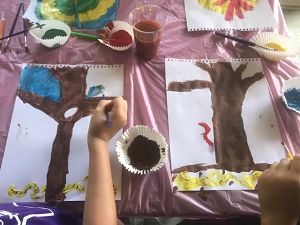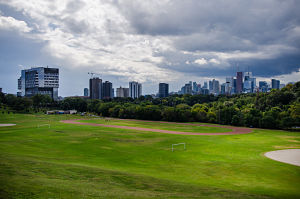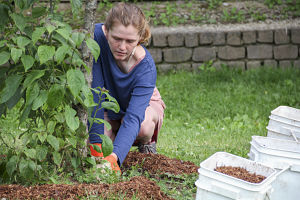
Claire is the Youth Program Assistant at LEAF.
Question: What inspired you to become involved with the urban forests?
Answer: Studying sustainability at Dalhousie University has opened my eyes to the interactions between people and their environment. In particular, it has exposed me to how integral the urban forest is in making our cities livable. My job at LEAF is to help run the Junior Urban Forest Ranger program, which is an urban forestry workshop for City of Toronto day campers. I often ask our campers to imagine a Toronto without trees. The campers, even at such a young age, are usually quick to realize that without trees our city would be a much less pleasant place to live. From filtering pollutants out of our air, to providing shady gathering places, trees are an essential part of the Toronto I know and love, and just like my campers, I could not imagine the city without them.

Campers get a chance to make tree-related artwork, as well as their own Forest Ranger Badges.
Question: How did you find out about LEAF? How have you been involved?
Answer: I started at LEAF this summer as the Youth Program Assistant. In this role, I run our Junior Urban Forest Ranger’s Program. This program, called JUFR for short, aims to connect City of Toronto Day Campers with nature and with Toronto’s urban forest. By leading activities such as tree mulching, creating art, and various environmentally-focused games, my coworkers and I try to create a fun and meaningful morning for our campers. I particularly love the activity we run at the beginning of each session. We have the campers shut their eyes and imagine a forest. When we ask them if the forest they’re picturing looks like Riverdale Park East, where our program takes place, they always say no, noting that roads and cars and this many people are not in forests. It’s always with a little shock that the campers learn we are in fact in a forest, even if we can hear TTC buses, and see the CN Tower. By the end of the morning, they come to realize the importance and the unique qualities of the urban forest.

Riverdale Park East, surrounded by the city and all its accompanying noises, is not what the campers imagine when they think of a forest.
Question: What motivates you to remain involved with LEAF? Have you had a defining moment you could share?
Answer: It has been particularly motivating to watch the campers gain an understanding of why trees are so important to their lives as Torontonians. Often, when we first ask the campers why we need trees, they say “to make oxygen” and “for fruit”. But, by the end of the morning, we have exposed our campers to the other, perhaps less obvious roles trees play – from the spiritual significance they hold for some Indigenous groups, to the mental health benefits they may have for patients recovering at the nearby Bridgepoint Health Centre.
To me, the amount learned by our campers is most obvious during the “graduation” from the JUFR program. In order to earn the title of Junior Urban Forest Ranger, our campers must decorate their own badge and sign a pledge. The badges are always decorated with the utmost concentration, and we have seen campers write “I love trees” and “I will protect trees” again and again. When the campers sign the pledge, they make a promise to “protect the urban forests and help others do the same”. To me, this graduation shows that the seeds of environmentalism and stewardship have been planted and that our campers have begun a journey of valuing and protecting our urban forest.

Campers take part in tree mulching, which is one of their favourite parts of the Junior Urban Forest Rangers program!
Question: Why is the urban forest important to you? What message would you share with others to encourage them to become involved?
Answer: Many people value trees due to their role as carbon sinks and oxygen producers. While these roles are without a doubt important, trees also do so much more for us. Trees have been shown to improve mental health, lower stress and promote relaxation. The presence of trees is also associated with better focus, and can even lessen the symptoms of ADHD. In fact, I often see these benefits in action. Despite numerous distractions, including an awesome historic canon and people practising tai chi with cool swords, our kids are able to focus on making perfect doughnut shapes out of mulch and searching for fallen seed pods. All of this is to say, while trees are incredibly important in the big picture to fight climate change and more, they also do so much to make each individual in our large city happier and healthier.
Claire is the Youth Program Assistant at LEAF.
The Junior Urban Forest Rangers program is supported by Park, Forestry and Recreation Division, City of Toronto.
